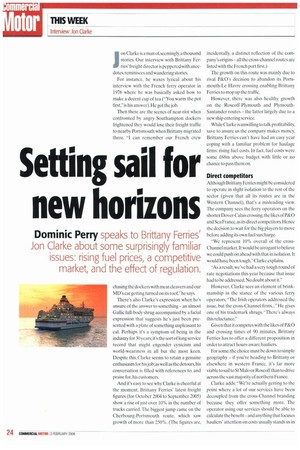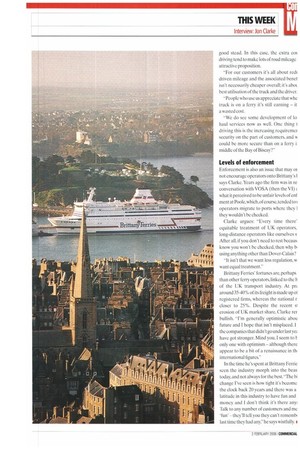Setting sail for new horizons
Page 24

Page 25

If you've noticed an error in this article please click here to report it so we can fix it.
Dominic Perry speaks to Brittany Ferries'
ion Clarke about some surprisingly familiar issues: rising fuel prices, a competitive market, and the effect of regulation.
Jon Clarke is a man otseemingly, a thousand stories. Our interview with Brittany Ferries' freight director is peppered with anecdotes, reminisces and wandering stories.
For instance, he waxes lyrical about his interview with the French ferry operator in 1976 where he was basically asked how to make a decent cup of tea ("You warm the pot first," is his answer). He got the job.
Then there are the scenes of near-riot when confronted by angry Southampton dockers frightened they would lose their freight traffic to nearby Portsmouth when Brittany migrated there. "1 can remember our French crew chasing the dockers with meat cleavers and our MD's ear getting turned on its roof," he says.
There's also Clarke's expression when he's unsure of the answer to something— an almost Gallic full-body shrug accompanied by a facial expression that suggests he's just been presented with a plate of something unpleasant to eat. Perhaps it's a symptom of being in the industry for 30 years: it's the sort of long service record that might engender cynicism and world-weariness in all but the most keen. Despite this, Clarke seems to retain a genuine enthusiasm for his job; as well as the detours, his conversation is filled with references to, and praise for, his customers.
And it's easy to see why Clarke is cheerful at the moment. Brittany Ferries' latest freight figures (for October 2004 to September 2005) show a rise of just over 10% in the number of trucks carried. The biggest jump came on the Cherbourg-Portsmouth route, which saw growth of more than 250%. (The figures are, incidentally, a distinct reflection of the company's origins—all the cross-channel routes are listed with the French port first.) The growth on this route was mainly due to rival P&O's decision to abandon its Portsmouth-Le Havre crossing enabling Brittany Ferries to mop up the traffic.
However, there was also healthy growth on the RoscoffPlymouth and PlymouthSantander routes — the latter largely due to a new ship entering service.
While Clarke is unwilling to talk profitability, save to assure us the company makes money, Brittany Ferries can't have had an easy year coping with a familiar problem for haulage firms: rising fuel costs. In fact, fuel costs were sonic £68m above budget with little or no chance to pass them on.
Direct competitors Although Brittany Ferries might he considered to operate in slight isolation to the rest of the sector (given that all its routes are in the Western Channel), that's a misleading view. The company sees the ferry operators on the shorter Dover-Calais crossing, the likes of P&O and Sea France,as its direct competitors. Hence the decision to wait for the big players to move before adding its own fuel surcharge.
"We represent 10% overall of the crossChannel market. It would be arrogant to believe we could push on ahead with that in isolation. It would have been tough," Clarke explains.
"As a result, we've had a very tough round of rate negotiations this year because that issue had to be addressed. No doubt about it."
However, Clarke sees an element of brinkmanship in the stance of the various ferry operators. "The Irish operators addressed the issue, but the cross-Channel firms..." He gives one of his trademark shrugs. "There's always this reluctance."
Given that it competes with the likes of P&O and crossing times of 90 minutes, Brittany Ferries has to offer a different proposition in order to attract hours-aware hauliers.
For some, the choice must be down to simple geography — if you're heading to Brittany or elsewhere in western France, it's far more viable to sail to St Malo or Rom:off than to drive across the vast majority of northern France.
Clarke adds: "We're actually getting to the point where a lot of our services have been decoupled from the cross-Channel branding because they offer something more. The operator using our services should be able to calculate the benefit— and anything that focuses hauliers' attention on costs usually stands us in good stead. In this case, the extra cos driving tend to make lots of road mileage attractive proposition.
"For our customers it's all about redi driven mileage and the associated bend isn't necessarily cheaper overall; it's allot best utilisation of the truck and the driver.
'People who use us appreciate that whc truck is on a ferry it's still earning it a wasted cost.
"We do see some development of la haul services now as well. One thing t driving this is the increasing requirerner security on the part of customers. and vi could be more secure than on a ferry middle of the Bay of Biscay'?"
Levels of enforcement
Enforcement is also an issue that may or not encourage operators onto Brittany's I says Clarke. Years ago the firm was in re conversation with VOSA (then the VI) r what it perceived to be unfair levels of enf ment at Poole, wh ich, of course, tended to operators migrate to ports where they I they wouldn't be checked.
Clarke argues: "Every time there' equitable treatment of UK operators. long-distance operators like ourselves s After all, if you don't need to rest becaus, know you won't be checked, then why b using anything other than Dover-Calais? It isn't that we want less regulation. w want equal treatment."
Brittany Ferries' fortunes are, perhaps than other ferry operators, linked to the h of the UK transport industry. At prc around 35-40% of its freight is made up ol registered firms, whereas the national r closer to 25%. Despite the recent si erosion of UK market share. Clarke rer bullish. "I'm generally optimistic abou future and I hope that isn't misplaced. I the companies that didn't go under last yet have got stronger. Mind you, I seem to I. only one with optimism although there appear to he a hit of a renaissance in thi international figures."
In the time he's spent at Brittany Ferric seen the industry morph into the beas today. and not always for the best. The hi change I've seen is how tight it's become the clock hack 20 years and there was a latitude in this industry to have fun and money and I don't think it's there any' Talk to any number of customers and mc 'fun' they'll tell you they can't remembi last time they had any.he says wistfully.




























































































































































































